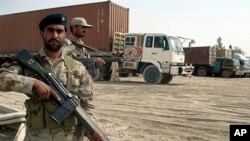Media reports on Friday are quoting unnamed U.S. officials as saying not all members of Pakistan's military will be benefiting from a proposed $2 billion aid package U.S. Secretary of State Hillary Clinton unveiled Friday. According to the reports, Washington will suspend assistance to some Pakistani military units suspected of human rights abuses.
The alleged abuses include the killings of unarmed prisoners and civilians during recent military offensives against Taliban forces in Pakistan. The New York Times newspaper reports that U.S. officials were alarmed by an Internet video - the authenticity of which has not been confirmed - that appears to show men in Pakistani uniforms executing six young men in civilian clothes.
Pakistan says it is investigating the incident. The army chief, General Ashfaq Kiyani, has ordered his forces to respect the rule of law.
Ali Dayan Hasan, of Human Rights Watch in Pakistan, says the video shows abuses that his group has documented extensively in Swat Valley, where the Pakistani military carried out a campaign against militants last year.
"I would stop short of saying there was some sort of policy to engage in summary executions that were sanctioned by higher authorities," Hassan says. "But the fact is that this activity, while not systematic has certainly been widespread. And it has been widespread because of Pakistani military troops feel they can perpetrate such abuses with impunity."
The aid is being held under a law passed in 1997 barring military assistance from going to foreign troops suspected of committing atrocities.
The move appears to be symbolic to address concerns by members of Congress suspicious of the Pakistani government,says Farzana Shaikh, a Pakistani expert at Chatham House in London.
"I believe very largely to appease those in Congress who must still approve such assistance to Pakistan, appease members of Congress who have for some time raised serious questions about human rights violations in Pakistan," says Shaikh.
The U.S. appears to be taking a "carrot-and-stick" approach of incentives and penalties with Pakistan, says Shaikh.
U.S. officials have accused Pakistan of not doing enough to fight militants inside its borders, a charge that has riled the Pakistani leadership.
Relations have never been as tense, Shaikh says, and efforts on both sides to improve trust remain problematic. She points to Pakistan's recent closure of border crossings to Afghanistan used by NATO supply trucks, during which hundreds of trucks were torched by militants.
"And I think the closing of those borders was a reflection not only of the prevailing mistrust between Pakistan and the United States," she says. "But I think more ominously a signal from Pakistan that it does actually have some sort of leverage on the United States and that this transactional relationship isn't one that can just be manipulated to the advantage of the United States and that Pakistan does indeed have some cards of its own to play."
The $2 billion in military assistance announced by Clinton Friday is just the latest in a series of aid packages given to Pakistan. Since the country became a key ally in the U.S.-led war on terrorism in 2001, Islamabad has received around $10 billion in U.S. military aid.




